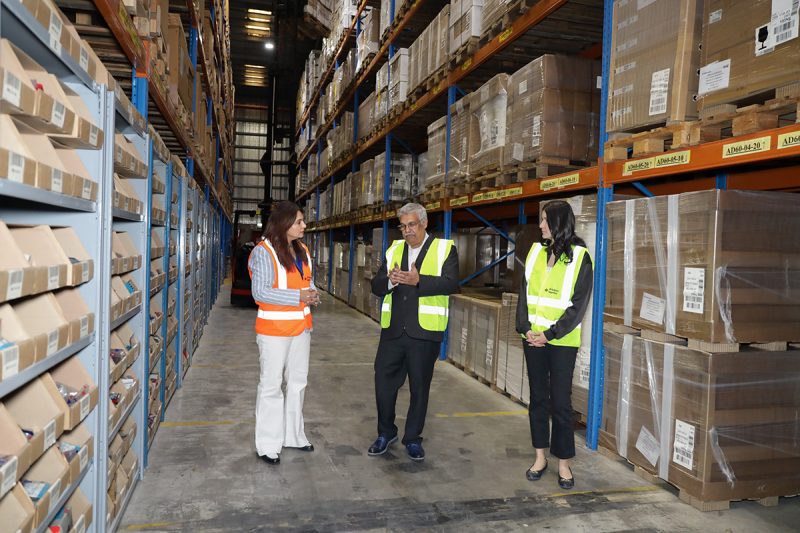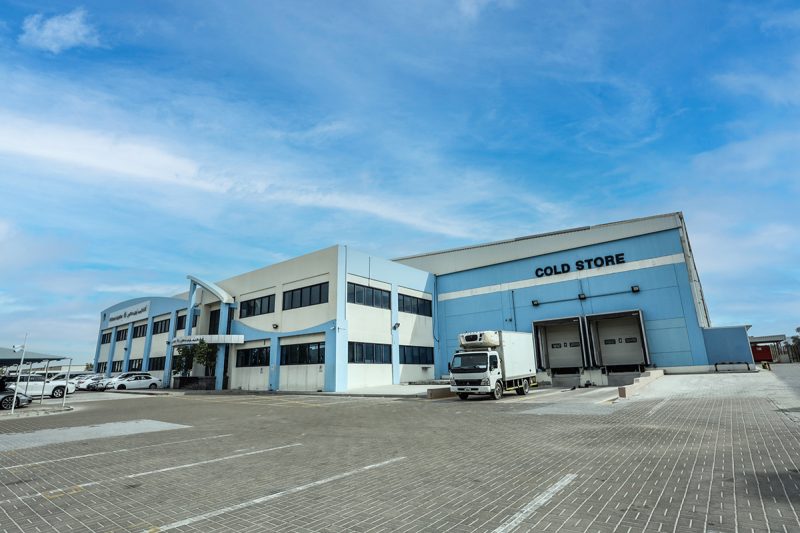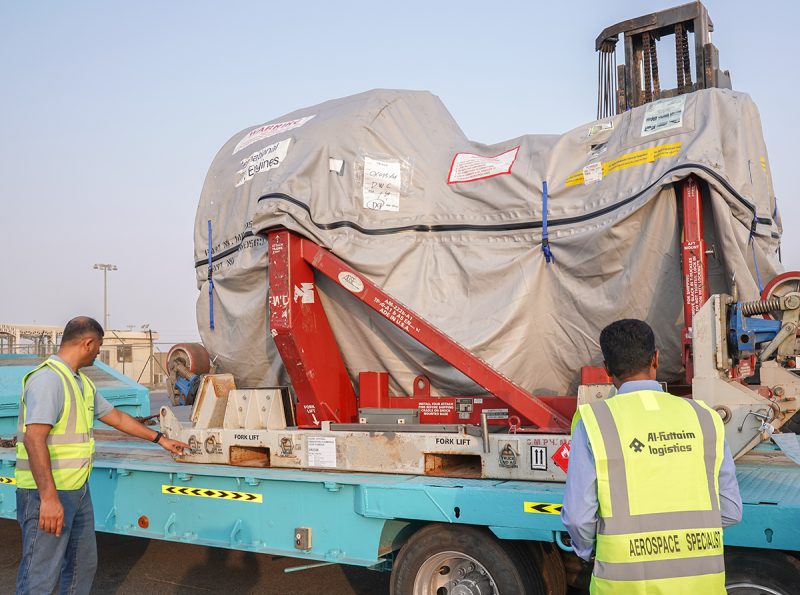Al-Futtaim Logistics Ascends to New Heights with Prestigious ASA-100 Accreditation
In an era marked by rapid transformation in the logistics sector, Al-Futtaim Logistics has emerged as a vanguard of innovation and sustainability.
In an exclusive dialogue with Air Cargo Update’s Associate Publisher, Poonam Chawla, Dr. Raman Kumar, the pioneering Managing Director of Al-Futtaim Logistics, reveals the company’s groundbreaking strategies and its ascent to the zenith of industry excellence.
As the MENA region catapults onto the global stage as a pivotal player in air cargo, Dr. Kumar’s insights offer a captivating glimpse into the future of logistics. From cutting-edge 5G tracking systems to AI-powered document processing, Al-Futtaim Logistics is harnessing state-of-the-art technology to navigate the complexities of a post-pandemic world.
New Markets for Aerospace
How is the MENA region emerging as a key player in the global air cargo industry?
The air cargo industry is at a transformative juncture. Digitization, e-commerce and sustainability will remain pivotal in shaping its future. Companies that embrace these trends and invest in innovative solutions will lead the way.
The MENA region is on the cusp of becoming the epicenter of global air cargo operations. Airlines like Emirates, Qatar Airways and Saudia Cargo are driving this growth, supported by the region’s strategic location.
The geographical advantage allows for swift connections between Asia, Europe and the Americas. Goods often transition from sea to air in this region, facilitating rapid delivery to destinations worldwide. For example, Saudi Arabia’s central position enables quick deliveries to key markets within hours.
Visions like Saudi 2030 and the UAE’s development plans underscore the region’s potential. With strategic investments and advancements, the MENA region is poised for remarkable growth in the air cargo sector.
In 2025, we are expanding our aerospace logistics services to KSA, Kuwait and Oman and will be offering customers time critical freight and local services solutions. Over time, we have gained momentum through client recommendations. The services we will extend in these new markets includes freight solutions for AOGs, time critical parts from MROs, airlines and part suppliers, overcoming uncertainties and designing custom solutions to respond to the aerospace client’s pain points.
Al-Futtaim Logistics, being part of one of the largest automotive conglomerates in the UAE – Al-Futtaim Automotive, is poised to spearhead this charge into a more interconnected, efficient and sustainable future.
Secure Aerospace Logistics
Dr. Kumar, Al-Futtaim Logistics has recently secured the prestigious ASA-100 accreditation. Can you elaborate on the significance of this achievement?
Securing the ASA-100 accreditation is nothing short of a prestigious moment for Al-Futtaim Logistics. This accolade propels us into an elite echelon, as one of only five 3PL companies globally to hold this esteemed accreditation. It’s not merely a feather in our cap; it’s a resounding affirmation of our unwavering commitment to excellence in freight handling and security standards in aerospace logistics.
 Al-Futtaim Logistics’ compliance with ASA-100 standards includes meticulous documentation control to ensure traceability and accountability for all aircraft parts. Rigorous inspections are conducted on inbound and outbound shipments to identify and address any hazardous materials, suspected unapproved parts, or counterfeit components. When such items are detected, Al-Futtaim Logistics swiftly notifies clients and implements quarantine and segregation procedures to maintain safety and quality standards.
Al-Futtaim Logistics’ compliance with ASA-100 standards includes meticulous documentation control to ensure traceability and accountability for all aircraft parts. Rigorous inspections are conducted on inbound and outbound shipments to identify and address any hazardous materials, suspected unapproved parts, or counterfeit components. When such items are detected, Al-Futtaim Logistics swiftly notifies clients and implements quarantine and segregation procedures to maintain safety and quality standards.
How will this accreditation impact your clientele and operational paradigm?
For our customers, it means they can trust us to handle their freight with utmost care and precision, especially when it comes to safety of parts and products. This certification ensures that we meet and exceed industry standards, providing our clients with peace of mind and reliable service. It instills an unprecedented level of confidence in our ability to handle cargo with surgical precision and utmost care. This isn’t just a seal of approval; it’s an ironclad guarantee of reliability and excellence, equipping us to tackle the most formidable logistics challenges.
In what ways does the ASA-100 accreditation align with Al-Futtaim Logistics’ overarching strategy?
The ASA-100 accreditation serves as the cornerstone of our forward-thinking strategy. In the dynamic realm of logistics, stagnation is tantamount to regression. This certification acts as a springboard for perpetual innovation. We are not content with merely maintaining
standards; we are committed to continually raising the bar. Our goal isn’t just to participate in the logistics industry; it’s to reshape its very foundations.
Last Mile E-Commerce
How have customer expectations and logistics evolved in e-commerce over the last five years?
E-commerce has undergone a rapid transformation. What previously took decades to develop now evolves within a few years. If companies fail to adapt swiftly, competitors will overtake them.
Think about how straightforward it is to order items from anywhere in the world and receive them within a week, something that was unimaginable just a few years back. Today, this has become the norm, all thanks to improvements in last-mile logistics.
 The global e-commerce companies have set new benchmarks by transitioning from e-commerce to becoming global logistics leaders. Their efficiency in digitization and innovation has become a model for others. At Al-Futtaim Logistics, we have introduced AI-driven solutions that automate document scanning and data extraction, reducing processing time from hours to minutes.
The global e-commerce companies have set new benchmarks by transitioning from e-commerce to becoming global logistics leaders. Their efficiency in digitization and innovation has become a model for others. At Al-Futtaim Logistics, we have introduced AI-driven solutions that automate document scanning and data extraction, reducing processing time from hours to minutes.
Last-mile delivery has also expanded from ground-based solutions to aerial logistics, showcasing the industry’s readiness to embrace innovation.
What role does collaboration play in shaping the future of the e-commerce industry?
Collaboration is essential for driving innovation in e-commerce. While e-commerce will coexist with traditional courier and logistics businesses, there will be a shift in balance. Traditional methods won’t disappear, as services like urgent shipments and fuel transport remain essential. Instead, the focus should be on fostering healthy competition and leveraging each company’s strengths to propel the industry forward.
Environmentally Conscious 3PL
Could you elaborate on Al-Futtaim Logistics team’s sustainability initiatives?
Sustainability is a cornerstone of our operations, aligning with the UAE’s net-zero emissions goal by 2050 and Al-Futtaim’s internal targets. We address sustainability through controllable and non-controllable factors. For instance, while we rely on shipping partners for fuel emissions, we actively manage our fleet operations.
Our initiatives include transitioning vehicles to biofuels like B5 and B100. The latter uses sustainably sourced raw materials, significantly improving our net-zero score. Additionally, we have incorporated electric vehicles (EVs) and hybrid trucks into our fleet to further reduce emissions. To validate these efforts, we have partnered with Green Freight Asia for sustainability audits. After a rigorous three-year process, we are nearing the highest possible sustainability score. These efforts reflect our commitment to regulatory requirements and actionable sustainability targets.
Digitization
How is digitization transforming the cargo industry?
Digitization is streamlining operations and reducing manual processes in the cargo industry. We at Al-Futtaim Logistics have implemented digital initiatives like Yard Management System for better automotive logistics operations, leading to increased productivity. The adoption of digital technologies has enabled real-time ocean container tracking and improved communication between stakeholders in the supply chain.
Digital solutions are providing better visibility across the supply chain. Freight forwarders can now collect and analyze vast amounts of data about shipments, carriers and markets, leading to better decision-making in pricing, routing and risk management. Al-Futtaim Logistics has deployed new technologies in their systems for contract logistics, general transport and last-mile deliveries, increasing transparency in the entire supply chain.
The industry is moving towards paperless operations, with innovations like the electronic Bill of Lading (e-BoL) reducing administrative burdens, eliminating manual errors and accelerating the documentation process. Digitization is enabling freight forwarders to provide better customer service. Al-Futtaim Logistics’ e-commerce logistics platform offers last-mile delivery, assembly services and shipment tracking, prioritizing customer convenience.
What are the key challenges in the implementation of digitization?
One of the biggest challenges is the lack of standardization across the industry, making it difficult for businesses to exchange information and connect electronically. There is also a lack of integration between different software systems, hindering a complete view of the supply chain.
Implementing digital solutions requires significant investment in time and money, which can be a barrier for small and medium-sized businesses. The industry needs to adapt to and effectively utilize new technologies. This includes training staff and updating existing systems to work with new digital solutions. With increased digitization comes the need for robust cybersecurity measures to protect sensitive data and ensure compliance with privacy regulations.
While digitization presents challenges, Al-Futtaim Logistics is embracing these changes to improve its operations and service offerings. The industry as a whole is moving towards a more digitized future, with the potential for significant improvements in efficiency, visibility and customer satisfaction.
The logistics landscape is undergoing a seismic shift. How is Al-Futtaim Logistics staying ahead of the curve?
The world has significantly changed, especially after COVID, emphasizing the importance of adopting digital solutions. Consumers now demand instant availability of goods, whether essential items or aerospace components, pushing for seamless logistics.
In aviation, supply chain efficiency has become critical. We are not merely adapting to change; we are orchestrating it. Our advanced 5G-compatible tracking systems and AI-driven document processing are revolutionizing our modus operandi. We are transmuting raw data into actionable insights, slashing processing times from hours to mere minutes. This digital metamorphosis isn’t just about enhancing efficiency; it’s about redefining the boundaries of possibility in logistics.
What has been the biggest impact of digitization on your operational ecosystem?
Digitization has impacted us in many ways. First, it has increased operational costs. However, this is offset by improved resource planning and operational efficiency. Integrated systems ensure seamless data flow without manual intervention, streamlining the supply chain for customers and us.
About Aerospace Logistics at Al-Futtaim Logistics
| · Headquartered in the UAE
· Established in 1980 · Airside operations in major UAE airports · 24 x 7 AOG operations · ASA-100 accredited 3PL services · 65+ aerospace network member and 300+ stations · Own aerospace hubs in Saudi Arabia, Kuwait and Oman by 2025 · Centralized aerospace services, with global coverage and dynamic freight, haulage and storage solutions · Technicians Onboard Charters (TOC) · Winner of Emerging Aerospace Logistics award |
For more information on services, please contact contact@aflogistics.com















